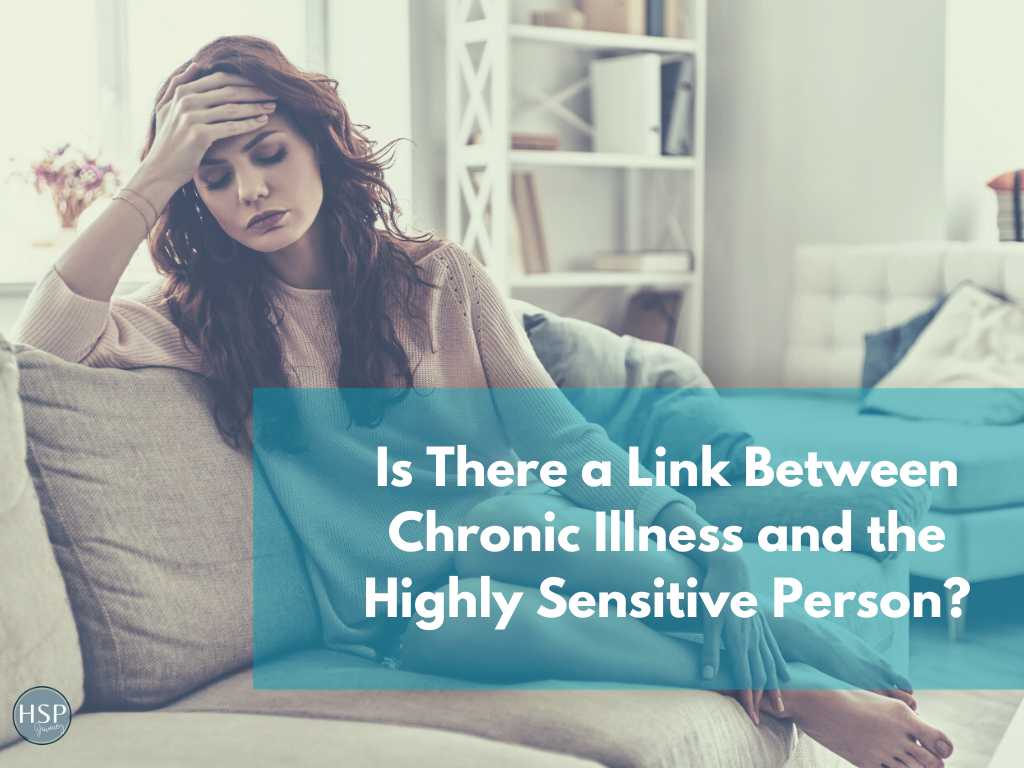As someone who has lived with rheumatoid arthritis (RA) since childhood, I often wondered, is there a link between chronic illness and the Highly Sensitive Person? I have a lot of personal experience with this issue and find that my clients also struggle with more chronic conditions than the average person. Whether you’ve experienced an autoimmune condition, chronic pain, or other life-altering long-term health conditions, you’ve certainly struggled with issues of blame, victimization, and sensitivity around your chronic condition.

Table of Contents
Chronic Illness Not ‘All in Your Head’ for HSPs
Perhaps you’ve been told, directly or indirectly, that it is ‘all in your head.’ Or, that if you just did more of something (exercising, eating organic foods, meditating) or less of something (thinking about your health, exposing yourself to chemicals, ruminating), you would get rid of your symptoms. If you are a Highly Sensitive Person (HSP), you might have been told you are simply too reactive to pain, stimuli, or challenges in life.
I’m not a medical doctor and cannot tell you the cause or the cure for what ails you, but I can say with complete certainty that your experience is NOT all in your head. The body and the brain, our genes, and our internal and external environments interact in extremely complex ways to influence our health.
Fortunately, as an HSP, you are used to thinking about the world and yourself in complex ways. Deep processing is one of the defining traits of being highly sensitive, along with the rest of the DOES acronym that describes our trait of sensory processing sensitivity (SPS): overstimulation, empathy, and sensitivity to subtle stimuli.
So, to answer the question we began with, yes, there are links between chronic illness and being highly sensitive. But, like so many aspects of being human, it is complicated.
Genes Probably Play a Role in the Relationship of Being Highly Sensitive and Chronically Ill
The interaction between our individual genetics and the environment in which we are raised and later live in as adults has been shown to contribute to the development of autoimmune diseases and other health issues. This research holds true for everyone, not just HSPs.
Research About Chronic Illness and the Highly Sensitive Person
Research going back over a decade has shown that there is a likely genetic link between something called central sensitization (CS) and conditions like fibromyalgia and chronic fatigue. CS seems to be at least partially driven by genes that lead some people’s nervous systems to become overly responsive to sensations and to register them as pain and/or mood symptoms.
In her review of this research, Dr. Elaine Aron notes that some of the genes involved in CS are also genes that are connected to being a Highly Sensitive Person. Dr. Elaine Aron explains how this genetic link may lead to HSPs experiencing greater physical and emotional health issues under certain circumstances:
There are quite a few genes implicated in CS, and two of these, involving dopamine and serotonin, are also common to HSPs. But HSPs are more prone to develop physical or emotional problems only when they are–that familiar list again–under stress, lack sleep, have had physical or psychological trauma as children or adults, been depleted by infection, and so forth. Probably at those times their sensitivity to pain increases also. All of this suggests that HS and some CS may be similar, in that both begin with a genetic susceptibility to both good and bad environments.
Dr. Elaine Aron
Environment is Always a Factor in How HSPs Function
Remember that part of what defines HSPs is our responsiveness to our environments, which is known as differential susceptibility. We benefit more than non-HSPs from the positive aspects of our environments but are more adversely impacted by the negative aspects of our environments.
It seems to me that differential susceptibility offers a theoretical reason for why HSPs may experience chronic illnesses. If we are dealing with environmental stressors of any sort—physical, emotional, relational, systemic—we will be more vulnerable to experiencing negative psychological and physical effects. A preprint of a research study released earlier this year seems to bear out this connection:
In unfavorable environments, higher SPS [sensory processing sensitivity] related to worse health while, in favorable environments, it related to better health, supporting the theory of SPS as a factor for differential susceptibility to environments. Our work demonstrates that SPS may be a risk factor for stress-related and somatic symptoms.
From Journal article, Sensory processing sensitivity associations with mental and somatic health in positive and negative environments: evidence for differential susceptibility
The findings of this study seem to echo earlier research. One study on stress found that perceived stress was related to poorer physical health and a wide range of physical health symptoms in a large study of Hispanic undergraduate students. Another study conducted in Iran found that highly sensitive adults with irritable bowel syndrome (IBS) were more likely to report negative health effects based on the duration of their illness, pointing to the way that a prolonged stressful situation adds to health challenges for HSPs.
Health Differences Show Up in Highly Sensitive Children and Adolescents
While I work exclusively with adults, many of my HSP clients who have chronic illnesses note that their symptoms, like mine, date back to childhood or adolescence. Whether or not they received a diagnosis or treatment before adulthood, many HSPs can look back and notice ways that their physical health began to deviate from typical experiences at very young ages.
Although the research into highly sensitive children and adolescents with health issues is limited, it points to the role that SPS has in potential adverse outcomes. Research in Israel shows that high sensitivity is a risk factor for being diagnosed with Type 1 diabetes by adolescence.
Furthermore, highly sensitive adolescents in a study in Switzerland were more likely to report a low quality of life due to chronic pain than their low-sensitivity peers. In my mind, it’s clear that we need to be more attuned to identifying highly sensitive children and adolescents so that we can give them the environmental support they need to have better health outcomes.
Being an HSP Does Not Doom You to Suffering from Chronic Illness
Getting back to the complexity of chronic illness and HSPs, I want to explicitly remind you of several points:
- Not every HSP will develop a chronic illness.
- Not every chronic illness is debilitating, whether or not the person is an HSP.
- It is not your fault that you have a chronic illness, nor are you solely responsible if it does not go away or improve.
- Your health symptoms are not ‘all in your head’ or a sign of a psychiatric condition.
While I have not aimed to do a comprehensive research review, I hope I’ve shown you enough evidence that the relationship between chronic illness and the Highly Sensitive Person is complex, multidirectional, and involves many factors, including genetics and your internal and external environments.
To me, this complexity offers hope, because it means that there are many different approaches you can take to do something to prevent or improve the way that you live with chronic illness. But you can’t do that without accepting that you, as a Highly Sensitive Person, are fundamentally different from the other 70-80% of the population. You need to live accordingly. As Elaine Aron beautifully states in her article on fibromyalgia (but which applies to any chronic illness):
It is clear, however, that for HSPs to avoid being susceptible to illnesses such as these, they do need to live in a way that helps them avoid becoming over stimulated and stressed. If you are living in a non-HSP world, however, you will often get messed up, of course, no matter how hard you try to avoid it. So, as you well know, you also need ways to manage during stressful times and after.
Dr. Elaine Aron
Start by educating yourself about what it means to be highly sensitive and how to live your Singularly Sensitive life. Take stock of how much stress you’re actually under since many HSPs minimize the effects stress has on them or compare themselves to others who “have it worse” than they do. The Holmes-Rahe Life Stress Inventory can help you understand and quantify/explain for yourself and others your vulnerability to stress.
Do the things that are good for anyone, but give HSPs that boost from differential susceptibility:
- Reduce the overstimulation in your environment
- Prioritize maintaining your body through sleep, movement, healthy foods, and hydration
- Feed your need for joy, aesthetic beauty, wonder, and spiritual connection
- Connect with people who support you for exactly who you are as an HSP
- Make a plan to deal with specific medical or dental anxiety that may be interfering with you getting the care that you need
- Learn to advocate for yourself within the medical system, especially if you find it hard to be assertive or are overcoming medical trauma
Chronic illness does not have to define you. However, just like being highly sensitive is central to your identity and is worthy of being included in your lifestyle choices, you deserve to make choices that center your physical needs as well. Please get in touch with me if I can help you in this process.
Be sensitive, be free
*This post contains affiliate links and I will be compensated if you make a purchase after clicking on my links*





[…] sensitive people are more prone to overstimulation, which can be exacerbated by chronic illness. When setting goals, consider how much energy and stimulation they will require. It’s […]